The Best Sci-Fi Books To Read This Summer
27:05 minutes
Whether you’ve had a hard time reading during the pandemic, or you zoomed through your book pile and are craving more, Science Friday’s annual list of the best summer science books is here for you.
As the world begins to open up, many of us are not quite comfortable traveling like we once did. But what a better way to escape without going too far than by immersing ourselves in some science fiction? Hit the beach—and another dimension, travel to space from the safety of your backyard, or take a hike back in time to an alternate era.
And this summer we tapped two sci-fi aficionados to help build our list. Annalee Newitz, science journalist and author of Four Lost Cities, and Gretchen Treu, co-owner of A Room of One’s Own Bookstore, in Madison Wisconsin, share their superb summer selections with Ira in front of a live Zoom audience.
Book Buyer and Events Coordinator for the independent bookstore A Room of One’s Own in Madison, Wisconsin
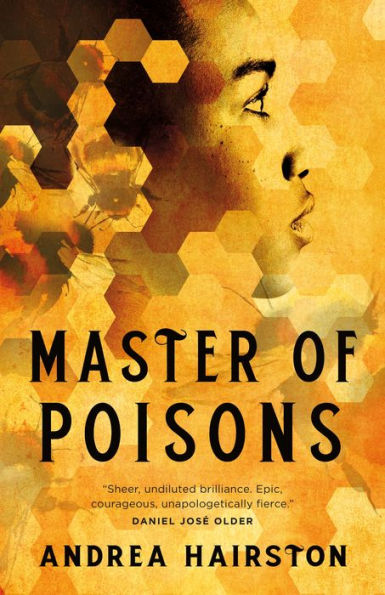 Master of Poisons
Master of PoisonsThis postcolonial African novel brims with magic and follows heroes whose work is about environmental stewardship and recognizing the ways ancestral approaches can influence change. The prose is heady and alive—you can just about hear it told as in an oral tradition. The effects of a poisoned climate and unsustainable and unequal practices are hastening a climate apocalypse. Restoring an equilibrium among many very different and often at-odds parties requires a great deal of spirit work and unconventional thinking. Master of Poisons is great for readers looking for something immersive, complex, and magically fulfilling.
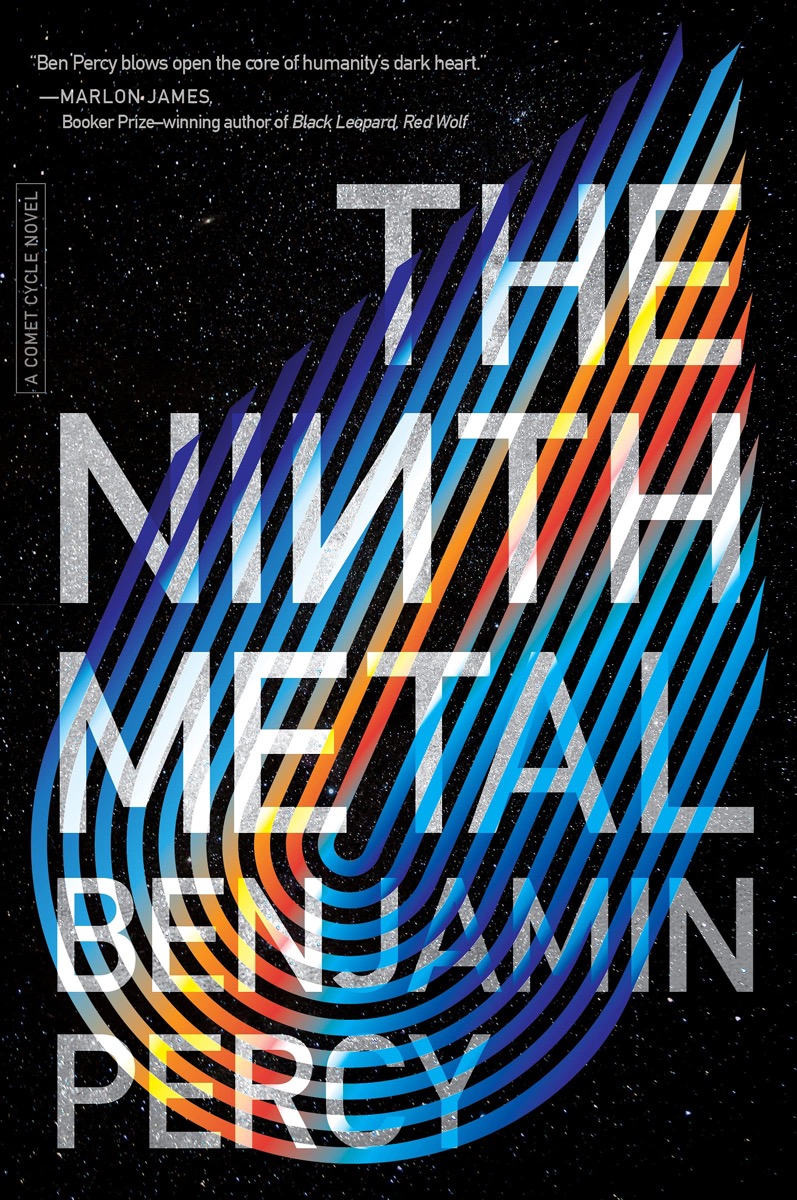 The Ninth Metal
The Ninth MetalA meteor crashes to earth in Minnesota, obliterating a significant portion of a small town, and introduces a totally new element to our planet. Control of the element, which turns out to have extraordinary potential for energy—or as a weapon—causes social upheaval as different interests vie for control of the scarce resource. There’s mystery and intrigue and a heavy dose of the Midwest in this book, which bills itself as a modern gold rush.
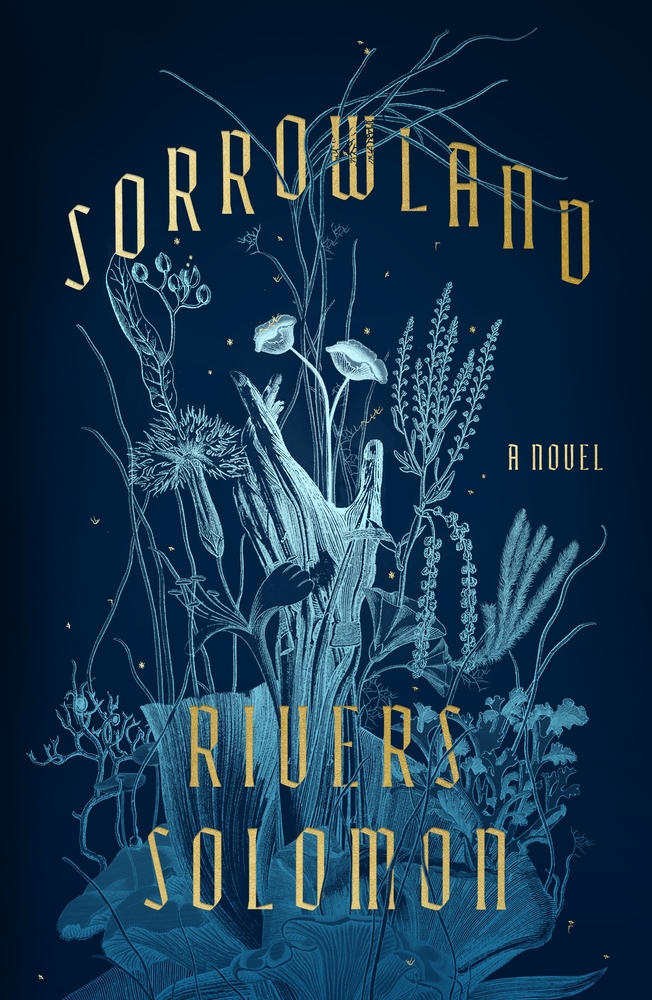 Sorrowland
Sorrowland Racism and social control via nonconsensual experimentation provide the tension in this novel featuring an intersex protagonist whose body is being colonized by a fungus that connects her to memories of other people from the same experiment. This is for readers who want something challenging, unexpected, intelligent, fierce and brilliant.
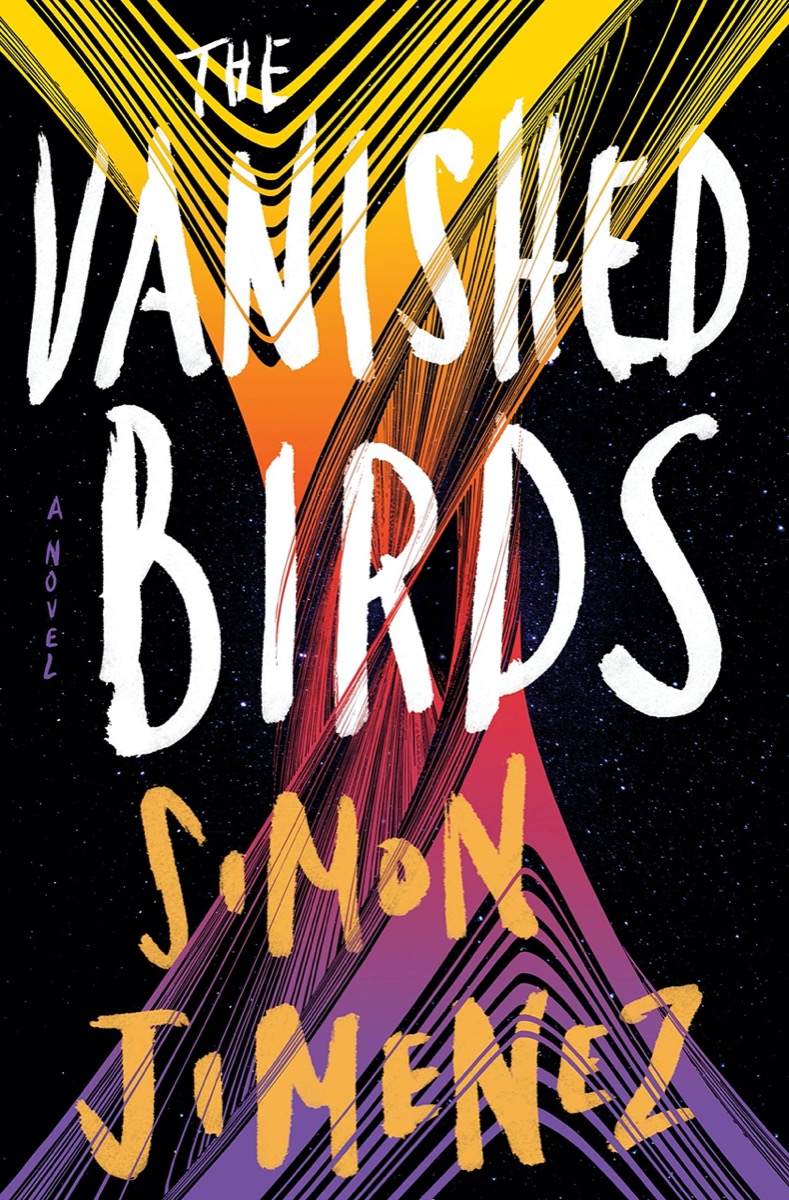 The Vanished Birds
The Vanished BirdsA very thoughtful multiple POV novel about the ways technology can impact human cultures, the way technological progress can at times be too directed by isolated genius and luck without care for the ripple effects. It’s also just an elegiac meditation on how families can be created, how grief impacts choice, and the small, mighty ways an individual can wrench the course of history by refusing to submit quietly to injustice. This is for readers looking for worldbuilding based on science and who enjoy science fiction that looks at the human side of technology.
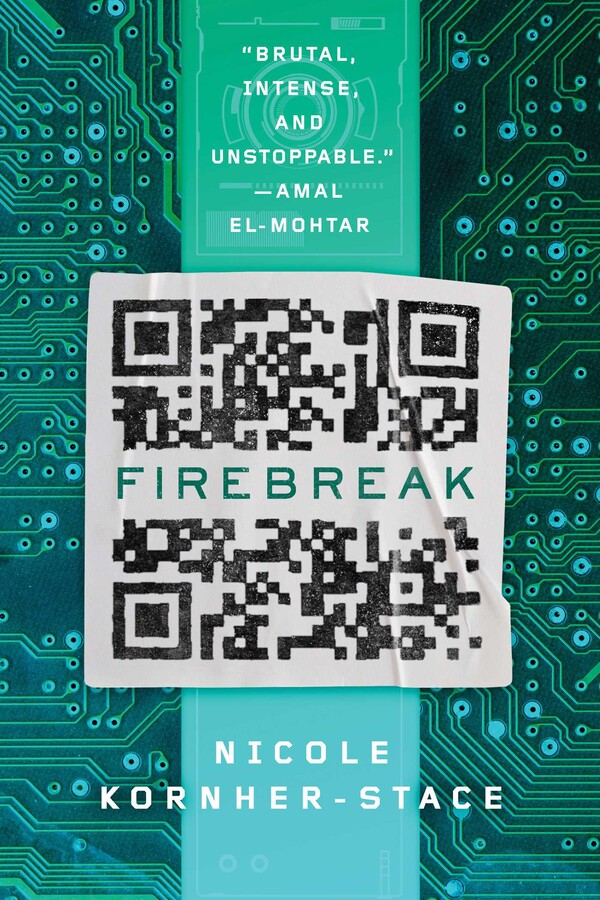 Firebreak
Firebreak This book is the feminist answer to Ready Player One and its sequel. The U.S. is split into two warring corporations. A young woman eking a life out of being mildly famous in a game developed by the corporations takes a side gig that allows her to uncover corporate malfeasance. This is for people who want something action-packed and a little dystopian with good politics.
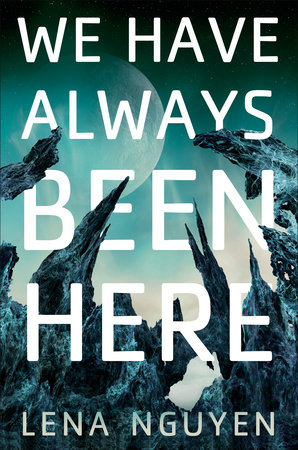 We Have Always Been Here
We Have Always Been Here Nguyen’s debut novel is a claustrophobic space survival thriller about how we might survive in extreme conditions in space. This one is for people who loved Alien and Event Horizon or the work of Arthur C. Clarke.
Science journalist, founder of io9.com, and author of numerous books, including Four Lost Cities
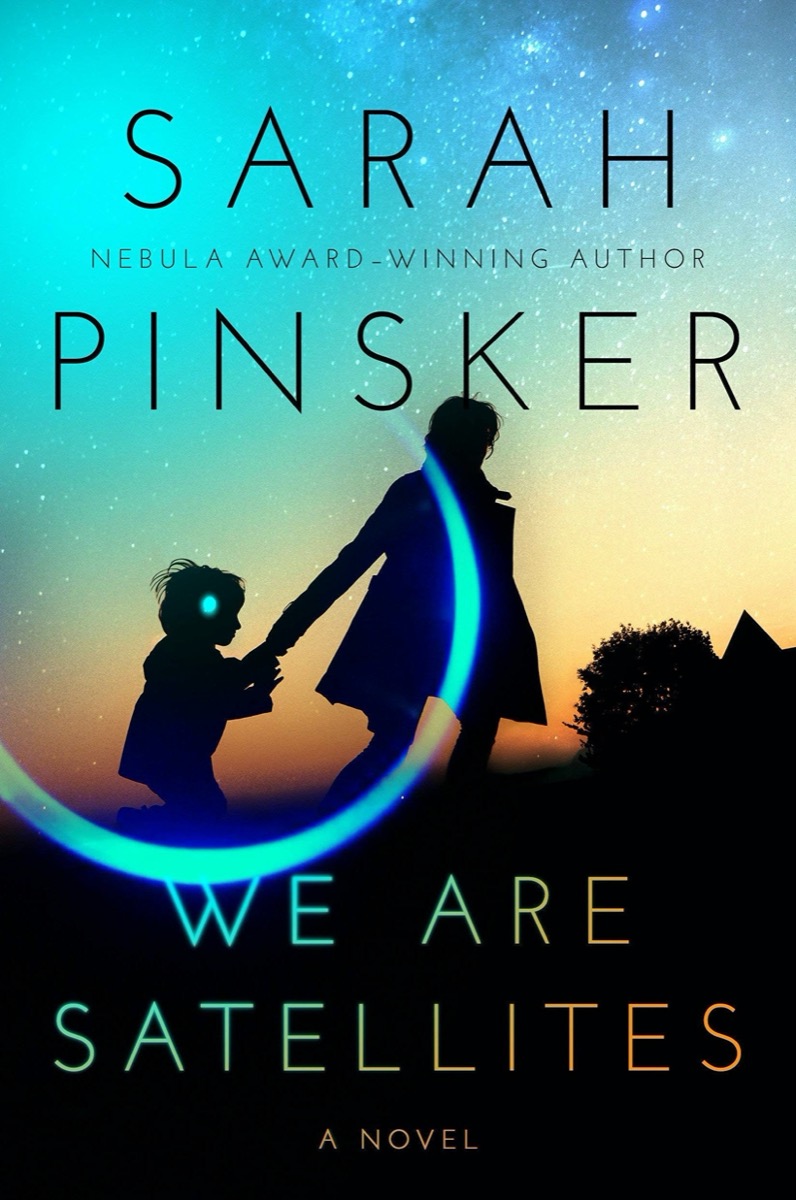 We Are Satellites
We Are SatellitesAward-winning author Pinsker is a master of character development, and showing how new technologies transform human relationships on a small scale. In this novel she introduces us to a chillingly plausible brain implant technology—designed to help people concentrate on multiple tasks—that circumvents the normal rules for regulatory oversight because it’s a “medical device” rather than a drug. We see how it affects the lives of people in one family, and eventually the world.
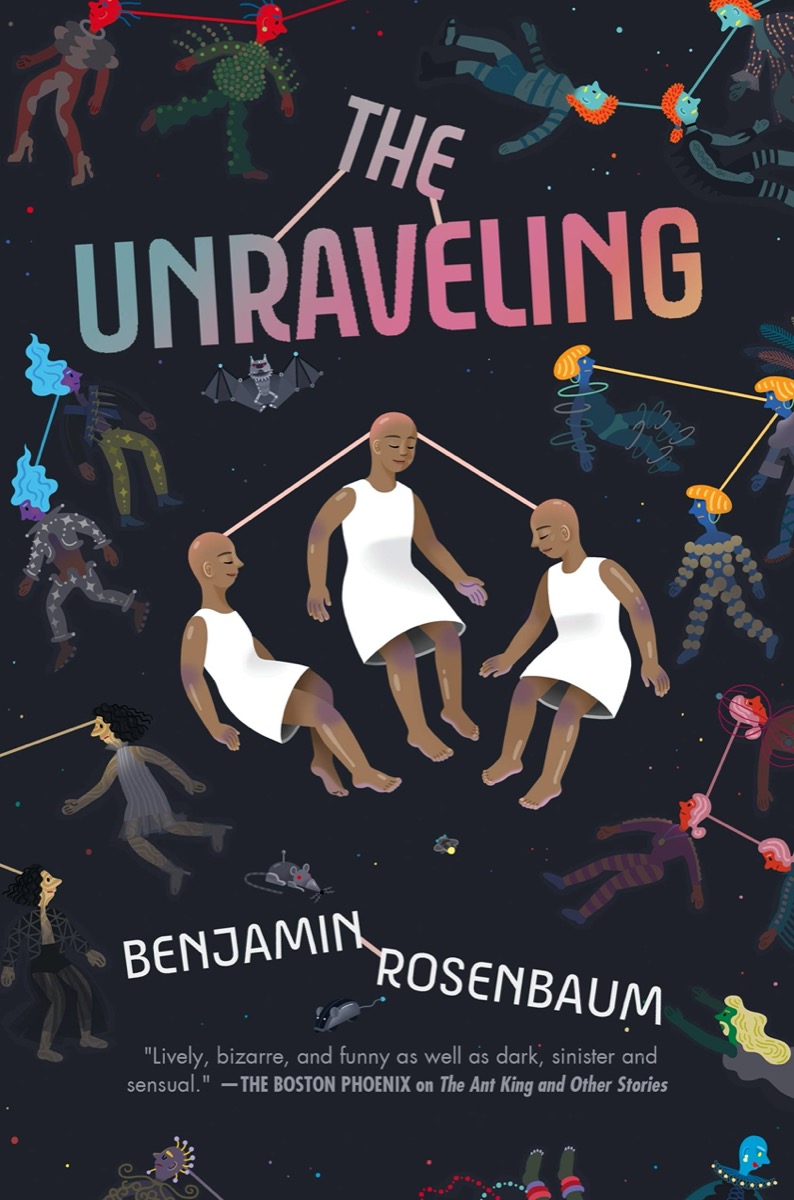 The Unraveling
The UnravelingA stunning far-future tale of what families might look like in a world where networking technology allows people to live in several bodies at the same time. Hint: there is no privacy, and “death” can come from simply shutting down the network.
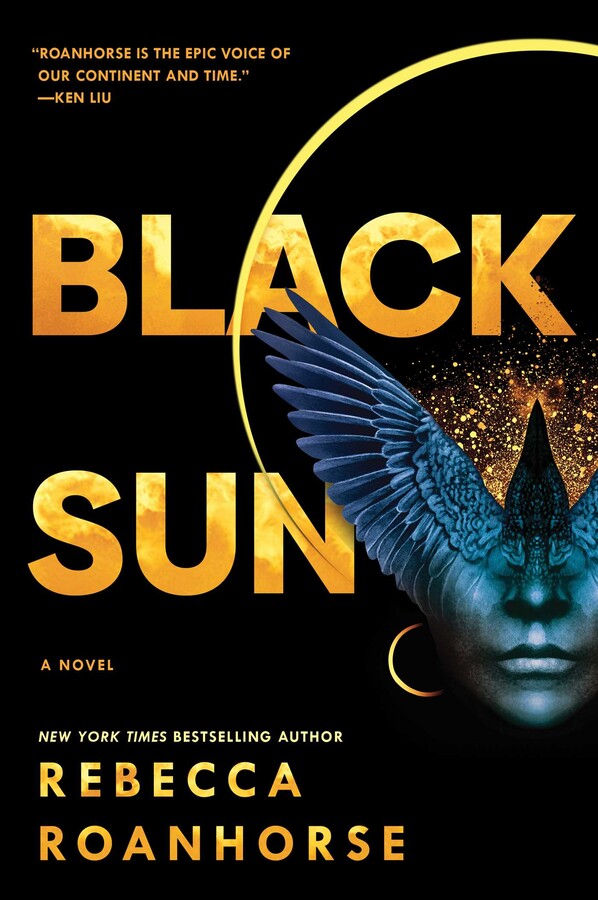 Black Sun
Black Sun Roanhorse tells a fantastical tale of government instability, betrayal, and magic—all set in a world that evokes the technological sophistication and political complexity of the Americas before colonialism.
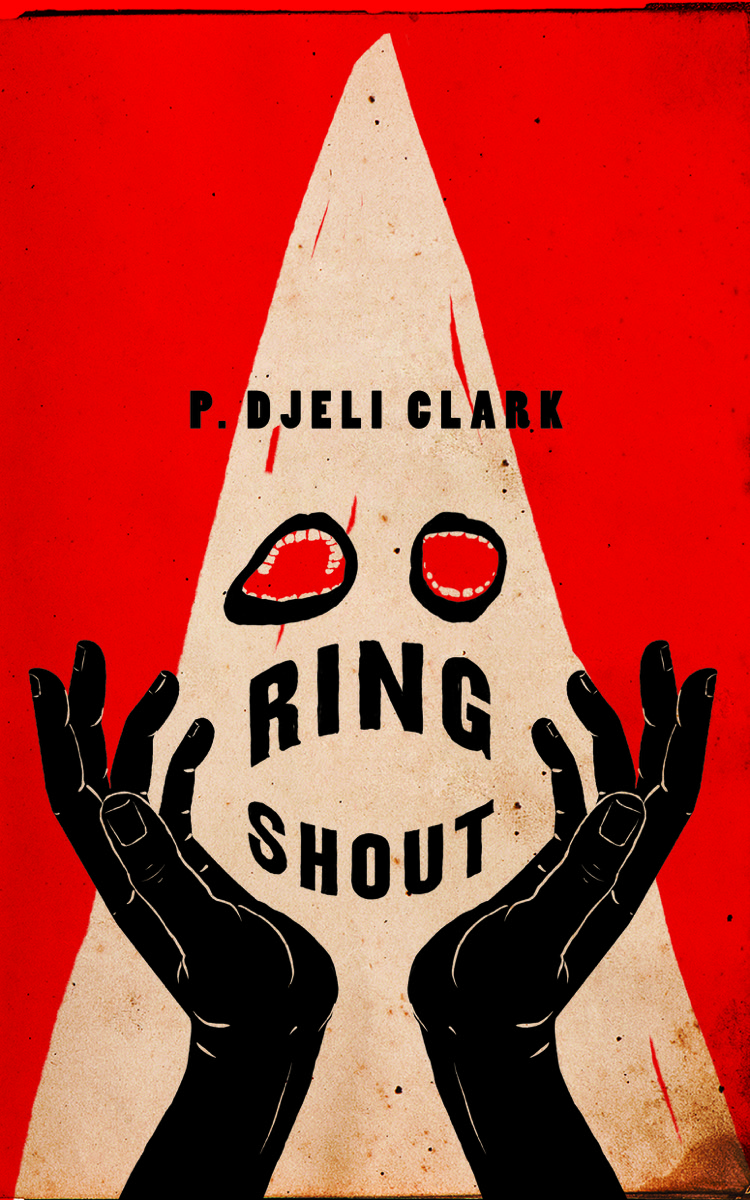 Ring Shout
Ring Shout This novella is a brilliant recreation of southern life during the rise of the second Klan in the 1920s. Except in this story, the Klan are actually monsters—and they’re controlling white people’s minds with the movie Birth of a Nation. What I love about this book is the perfect blend of historical accuracy and gonzo horror satire.
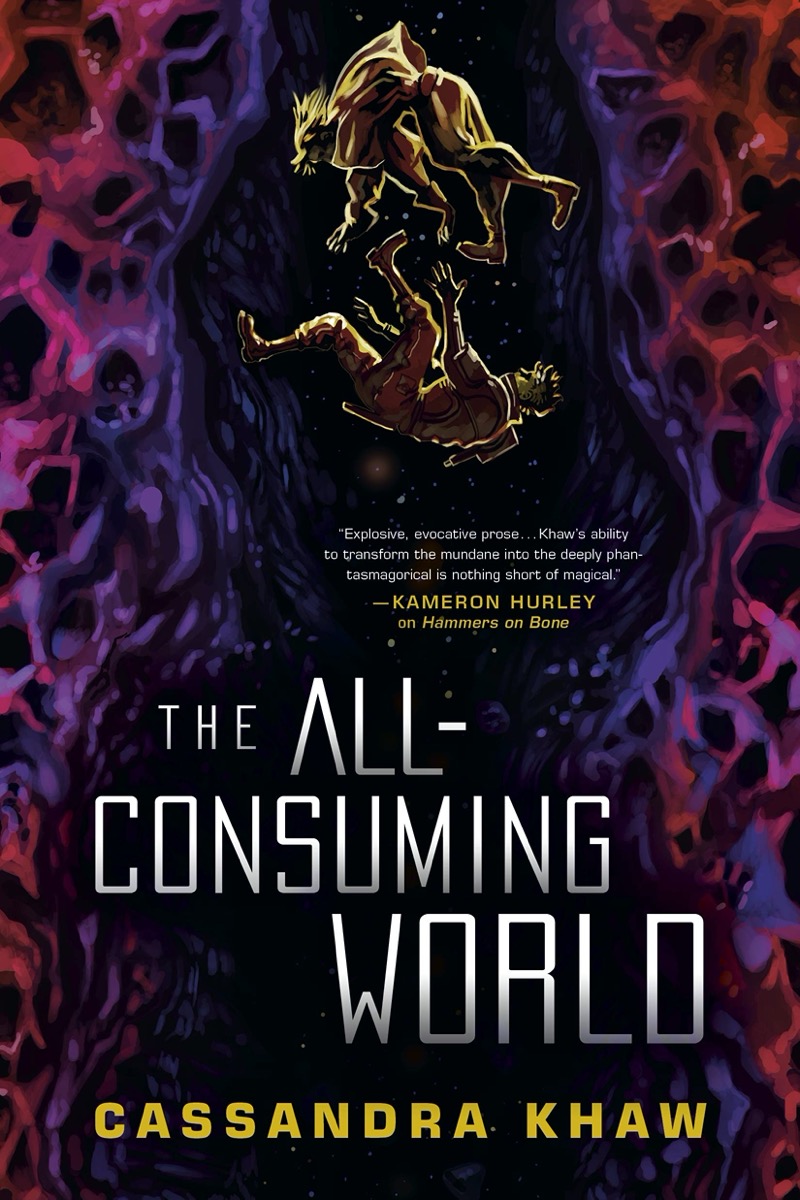 The All-Consuming World
The All-Consuming World Khaw’s story of down-and-out cyborg clones fighting impossibly powerful AI is one of my favorite new books about what cyborg consciousness might really be like in a few hundred years.
Science Friday is a Bookshop affiliate; when you buy a book from one of the links above, we get a portion of the proceeds from whatever you buy.
Invest in quality science journalism by making a donation to Science Friday.
Annalee Newitz is a science journalist and author based in San Francisco, California. They are author of Stories Are Weapons: Psychological Warfare and the American Mind, Four Lost Cities: A Secret History of the Urban Age andThe Future of Another Timeline, and co-host of the podcast Our Opinions Are Correct.
Gretchen Treu is co-owner of the independent bookstore A Room of One’s Own in Madison, Wisconsin.
IRA FLATOW: Whether you’ve had a hard time reading during the pandemic or you’ve zoomed through your to-do list and are craving more, you’re going to want to check out our annual list of the best summer science books. And this time, we’re doing something a little bit different.
The world is beginning to open up, right? But many of us are not quite comfortable traveling like we once did. So what better way to escape without going too far than immersing ourselves in science fiction? So you hit the beach, and you hit another dimension. Travel to space from the safety of your backyard, or take a hike back in time to an alternate era.
Joining me now for what we’re calling SciFri’s Summer of Sci-Fi. Get it? Are my two guests with some superb selections for summer reading, Annalee Newitz, science journalist, author of Four Lost Cities– a Secret History of the Urban Age, and Gretchen Treu, co-owner of A Room of One’s Own bookstore in Madison, Wisconsin. Welcome to Science Friday. Good to have both of you back.
GRETCHEN TREU: Thanks, Ira.
ANNALEE NEWITZ: Yeah, it’s great to be here.
IRA FLATOW: Nice to have you. A quick note– we are recording this segment in front of a live Zoom audience. So if you are interested in attending a future recording– and we’ve got a couple of really good ones coming up– head over to sciencefriday.com/livestream to sign up. Get in in our next Zoom audience, sciencefriday.com/livestream to sign up.
Annalee, you’re a science journalist and science fiction book author. Have you been doing any writing during this pandemic?
ANNALEE NEWITZ: Wow, yes, I actually have. I just– today, I’m finishing a novel that I was working on throughout the pandemic, and it’s very much an escapist book for me. I got to go to another planet with talking animals, and there is no pandemic happening on this planet. Lots of other terrible things are happening but no disease.
IRA FLATOW: Well, what kind of terrible things were going on?
ANNALEE NEWITZ: Well, it’s a book about terraforming, which means there’s a lot of interesting and creepy things happening with property rights on this planet and who owns what and who gets to chart the course of civilization on this new world, so a lot of different factions, including some flying moose, as one has in the future.
IRA FLATOW: Of course, they’re flying in the future. Gretchen, you work for an independent bookstore in Madison, Wisconsin. Can you give us an idea of what people were reading this past year?
GRETCHEN TREU: Yeah, wow. It was quite a spread of things. A lot of people are reading a lot of stuff about epidemics, and plagues, and everything. The Camus book, The Plague, was very popular in the first weeks, which surprised me because I was like, no, thank you. But yeah, as kind of things progressed during the summer, we had a lot of people ordering the big racial theory books, antiracist, Black Lives Matter stuff. We’re a very radical, feminist, intersectional bookstore, so that’s kind of where a lot of people came to get those books.
IRA FLATOW: Did they ever cross over in their reading habits into science fiction as an escape mechanism?
GRETCHEN TREU: Yeah. I mean, we’re known to have a pretty strong science fiction section, so a lot of people already order their sci-fi from us. But we also started doing subscriptions, and I curate the science fiction one. And it was way more popular than I thought it would be. So every month, I get to choose the best sci-fi books for people.
IRA FLATOW: Wow, wow. OK, well, let’s start doing that. Annalee, let me begin with you and your first book selection. Your first book pick, I understand, is We Are Satellites by Sarah Pinsker. Why choose that one?
ANNALEE NEWITZ: This is a really terrific new book that is beautifully written, really engaging, and touching. It’s really about a family and what happens when a craze for a new technology sweeps through the United States. And this is a brain implant, which is kind of a cross between maybe a mobile device and super Ritalin. And what it does is it lets people concentrate on multiple tasks and sort of switch between tasks and work much more effectively.
And what happens is this brain implant is widely adopted. It really changes how people can do school work. Because of Sarah Pinsker’s incredibly excellent eye for representing family life, we only see these changes as they affect this one family, where one mother and one child decide to get the implant and the other mother and the other child decide not to.
And we see how their relationships change. We see how this technology affects personal relationships. And then we also see, in the background, a bigger movement unfolding around having the company that’s made it held accountable for what some of the unintended side effects are.
IRA FLATOW: So this may be science fiction, but you’re dealing with real issues here, aren’t you?
ANNALEE NEWITZ: It’s real issues. It’s very believable. It feels like it’s something that could happen next year. And it’s just– her writing is just very inviting. If you like stories about family life, this is really a great book for you. It’s a nice way to kind of segue from fiction into a little bit of science fiction.
IRA FLATOW: I’m Ira Flatow. This is Science Friday from WNYC Studios. We are talking about our summer book list with Annalee Newitz, science journalist and author of Four Lost Cities– a Secret History of the Urban Age, and Gretchen Treu, co-owner of A Room of One’s Own bookstore in Madison, Wisconsin. OK, Gretchen your first book is really a classic sci-fi pick, Vanished Birds. Tell us about that.
GRETCHEN TREU: Yeah, this is a book that came out– it actually came out just before the pandemic, I think. And it came out in paperback recently. So it’s a really interesting take on how technology shapes culture, and it has a sort of– it goes back and forth between times and between different characters. There’s a rotating cast of characters.
And it just does this really classic sci-fi thing, where it looks at the impact of one technology and how it reverberates throughout all of civilization and how individual choices affect how that technology gets adopted and also the many inequalities within a culture that technology creates, whether that’s intended or not. It had just– it was a little sad in points and a little slow in points, but it had a really thoughtful take on personhood, and culture, and technology, and choice. So I just hope more people read it. I thought it was a fascinating book.
IRA FLATOW: It sounds like, as we used to call it, a very heavy, heavy book, something that’s really thoughtful.
GRETCHEN TREU: It was, yeah.
IRA FLATOW: If you’re into worldbuilding, then this is a pick for you.
GRETCHEN TREU: Totally.
IRA FLATOW: Yeah. Annalee, speaking of the social effects of technology, you’ve chosen a book with similar themes. It’s Ben Rosenbaum’s The Unraveling. It sounds like a new series coming up somewhere on Showtime or something like that.
ANNALEE NEWITZ: Yeah, Benjamin Rosenbaum’s novel is a very far future look at humanity. And so people have scattered to the stars tens of thousands of years ago. They’ve developed into this incredible high technology, where they can terraform planets. They literally scoop out the insides of planets and live inside them because that’s a better use of space.
And they also have the ability to network their brains together so that you can actually have one person who lives inside of like five bodies at once. So you can be doing one thing in one body and something else in another body and sleeping in another body. And even though the culture is super advanced, people still somehow manage to figure out a way to invent social roles around gender. Except in this world, they don’t have male and female anymore. They have two genders called Vail and Staid.
And Vails and Staids have very different roles in society. And our main character is a Staid who breaks the rules by falling in love with a Vail. And it actually winds up– it’s very romantic. It’s very sexy but sexy in a wholesome way. And their love winds up sparking a whole movement among young people on this planet who start creating fanfic about them, about how their romance works, and it leads to this revolution.
And I don’t want to give too many spoilers. But it’s just delightful, and it’s about– it’s very whimsical. But it’s also dealing with very weighty issues around how we try to restrain people by putting labels on them.
IRA FLATOW: So it doesn’t matter what planet or what culture you’re in, there’s some love angle going on. [LAUGHTER]
ANNALEE NEWITZ: There’s always got to be love.
IRA FLATOW: All you need is love, right? OK, so I’m surprised neither of you have talked about a science fiction book that’s dystopian. We’ve talked in years past about so many dystopian futures, but you’re saying this is sort of a hopeful future.
ANNALEE NEWITZ: I think that Benjamin Rosenbaum’s book is– it’s both. It has elements of utopian future. It has– people have lived for hundreds of years, and they go through space. But it’s also very dystopian because they have these rigid social roles that they really are chafing against. So I think, for me, what I really like in science fiction is when we get both, when it feels realistically good and bad.
IRA FLATOW: We have to take a break. But when we come back, more of the best science fiction books you’re going to want to read this summer plus recommendations from our listeners after this.
This is Science Friday. I’m Ira Flatow. Continuing with SciFri’s Summer of Sci-fi, our annual list of the best books to read this summer. This time, it’s all science fiction with my guests, sci-fi aficionados, Annalee Newitz, science journalist and author of Four Lost Cities– A Secret History of the Urban Age, Gretchen Treu, co-owner of A Room Of One’s Own bookstore in Madison, Wisconsin.
Let’s talk about, Gretchen– oh, let me think off the top of the head– what if Apple and Google took over the US and went to war with each other? That’s basically the premise of one of your picks in Firebreak, is it not? Something like that going on?
GRETCHEN TREU: It is. I tried to find one for the really tech-y, cyberpunk-y kind of reader. I’ve seen this book billed as the anarchist feminist answer to Ready Player One, and I think that’s super accurate. It has like a really fast pace. It’s really engaging and fun, and you get really sucked in. It’s sort of like you’re watching Tron in some moments.
But it’s also, again, dealing with weighty issues. I would consider it a squarely dystopian setting in some respects. Corporations have taken over the country, and there’s two evil megacorps working against each other. And the main character is, basically, a Twitch streamer who gets unwittingly involved in finding out some sinister underbelly stuff that’s been going on. And it becomes a very revolutionary story. I think most dystopian books have some element of how we’re going to work against the system that’s so oppressive.
IRA FLATOW: Right, right, yeah, I’ve read a lot of those kinds of science fiction books. Annalee, up next, we have your pick, Black Sun by Rebecca Roanhorse, is that correct?
ANNALEE NEWITZ: Yes. I am so excited about this book. If you are interested in some really great swashbuckling escapism, this is a terrific pick for the summer. And so Black Sun is set in a world that is not our own, but it strongly resembles the cultures around the Gulf of Mexico about 1,200 years ago.
So we have a group that are very much like the Maya. We have a group that are a lot like the ancient Puebloans, and a group that’s a lot like the ancient Mississippians. And of course, there’s also giant flying crows that people write on top of to go into war. There is a swashbuckling pirate character who’s fleeing from her past and helping a young man to get to a city that he may be able to change the fate of at some point.
But like I said, the characters are delightful. It’s a really fun adventure. But for me, the true delight is seeing Roanhorse build these cities up that we’ve read about in our history books and seeing them full of people and people gambling, and doing science, and sailing the oceans using advanced seafaring technology. So it’s just a super delightful, fun book.
IRA FLATOW: Wow, something for everybody. And you have to read it. I think you started doing it right, where you need that announcer saying, in a world where something.
[LAUGHTER]
I thought you were going there when you said that. You started–
ANNALEE NEWITZ: You know, that is kind of my mode. So yeah, in a world of ancient technology and giant flying crows.
IRA FLATOW: Now you got it. Now you got it. Well, I mean, and does it show that they’re technologically sophisticated folks in precolonial era, also?
ANNALEE NEWITZ: Yeah, that’s one of Roanhorse’s big interests, and she deals with this in a lot of her work is showing that Indigenous history is full of incredibly sophisticated civilizations, where they have astronomy and they have boat technology that’s very advanced. And it’s very international and cosmopolitan. And so that’s, like I said, another real thrill for anyone who is familiar with the true history of Earth, not of this fantasy world, is that it really reflects modern understandings of Indigenous culture 1,000 years ago.
IRA FLATOW: Wow, I want to read that one.
ANNALEE NEWITZ: You should. It’s so good.
IRA FLATOW: Gretchen, one of the themes of science fiction we actually really haven’t touched on yet is climate change. And your pick, Master of Poisons, correct?
GRETCHEN TREU: That’s right.
IRA FLATOW: It’s about environmental stewardship from an Indigenous perspective. Tell us about that.
GRETCHEN TREU: It set in this world where there’s a lot of climate change that’s encroaching upon the cities that people are living in. There are a lot of oppressive characteristics of the cities. And one of the main characters is connecting with her ancestral traditions, learning how to be a griot and stay out of trouble with the sort of religious cult that has taken on a lot of magical and social power.
And the story is really about reaching back to the roots of cultures who have historically lived in harmony with the land and taken stewardship of the land very seriously. And finding ways to not only combat the climate change that’s threatening their culture, but also to combat the oppressive forces that are keeping everyone down and trying to find a more egalitarian way. And what I really love about this book is that it gives the main character a chance not to just say, we should go back to the old ways and be traditionalist, but says, you are empowered by this.
You have this knowledge of how we did this. But it doesn’t mean that’s how we have to do it. You are smart and capable. You know our methods, and you can create change. And change is something totally new.
And also, it’s just such an immersive, unusual story. The prose is very different from what you often see in fantasy. It has an almost lyric quality.
IRA FLATOW: That sounds really cool. Let’s go to Linda from Silver Spring, who has a question about, of all things, aliens. Hi, Linda.
LINDA: Hello, thank you. I’ve just been reading in the press lately that the government may or may not be studying UFOs. And so I’ve been wondering, are there any recent books about visitors to our planet?
IRA FLATOW: Gretchen or Annalee, anything for our listener, for Linda, about aliens here, anything you might recommend?
ANNALEE NEWITZ: There’s a really great novel by Carol Emshwiller called The Mount, like as in horse mount, which is one of my favorite first contact stories. And it’s about an alien invasion on Earth. And we’re invaded by little teeny tiny kind of squishy aliens, but they manage to take over. And they turn human beings into their horses, basically, because they’re so teeny, they like to ride on our shoulders.
And they start breeding people. And they have like the Seattle breed and different kinds of breeds of people. And the main character– it’s very fairy tale-like. And the main character is one of these mounts, and he’s starting to learn about the history of Earth and what it used to be like. And it’s very beautiful, and it’s very intense. And I highly recommend it because it’s really off the beaten path of your typical alien invasion story.
IRA FLATOW: Let’s talk on a subgenre of sci-fi, and, of course, that’s the horror story. Annalee, you have a book pick here that you describe as being like the movie Get Out. Tell us about that.
ANNALEE NEWITZ: Yeah, it’s like Get Out or maybe like Lovecraft Country. This is a novella called Ring Shout by P. Djelí Clark. It just won the Nebula for Best Novella. And that’s because it’s just fantastically funny and exciting, but also it’s based in real historical events.
The author is a history professor. This is a pen name for a history professor. And it’s about the rise of the second clan in Georgia in 1922. And because this is a fantasy story, our main characters are monster hunters, and it’s a group of incredibly awesome, badass women.
One is a Gullah magic woman. One is a Choctaw scientist. One of them is a Marxist revolutionary. And they’re on the path of these demons called Ku Kluxes, who control the minds of white people using the brand new technology of movies. And they’re using the movie Birth of a Nation to brainwash white people into becoming demons themselves.
And so it’s both a very accurate representation of this dark historical period and also this fantastical kind of almost zany satire of how media can control us and how something like a movie can actually cause real rifts and really dark violent episodes. So I just highly recommend it. Like I said, if you liked Get Out or if you like Lovecraft Country, it’s really fantastic.
IRA FLATOW: Yeah, yeah, throwing everything into the pot on that one. Speaking of horror, Gretchen, I know that you have a pic that’s called, We Have Always Been Here a horror but in space. Wow.
GRETCHEN TREU: Yeah, I just finished it actually. I would consider it a little more thriller than horror, but it’s this fascinating book about a woman who is a psychologist. And she is really well versed in this type of psychology that, in the future, allows her to see people’s tiny facial tics and just the way that they hold their bodies, their body language, and determine things about their psyche from that.
And she’s stuck on this ship that’s going to investigate a planet to see if we’re going to go colonize that planet. And things are unraveling. There is androids on the ship who she connects with much better than she does her fellow humans. The humans don’t really trust her because she likes the androids so much.
It has this very claustrophobic feel. It reminded me a lot of the movie Alien in a lot of ways, in good ways. And in the end, it also kind of has some temporal dynamics and a lot of interesting thought on artificial intelligence as you learn more about what’s going on and why so many people are having these psychotic breaks and episodes and also what’s going on with the androids who are not what they seem.
IRA FLATOW: Wow. Fact is almost stranger than fiction these days with androids. Now, let’s go to Steve from Sacramento, who has a question about a book award this year. Hi, Steve.
STEVE: Hi. So I was wondering, what do you think should win the Hugo Award for Best Novel and Best Series?
IRA FLATOW: Hmmm. Yeah, Hugo is the top prize, Annalee, right?
ANNALEE NEWITZ: Yeah, it’s one of the big prizes. The Hugo and the Nebula are the two big science fiction and fantasy prizes. I think it’s always just fun to try to read all the novels because they’re usually– with a few exceptions, they’re usually all quite excellent. And so it’s worth just checking them out to see what people are excited about.
The Hugo awards are nominated by fans. So it’s anyone who is a reader. So it’s not a fancy group of judges who decide. It’s by fan vote, so your fellow fans are picking those out.
IRA FLATOW: I like that. I like– yeah. Vox populi, as we used to say. Hannah from Portland recommends a classic sci-fi author. Hannah, hi. Welcome to Science Friday.
AUDIENCE: Hi. Actually, it’s Hannah’s dad. [LAUGHS]
IRA FLATOW: A little shy, huh? That’s OK.
AUDIENCE: Yeah, I’m afraid so. We just listened to Philip Pullman’s series His Dark Materials. And I was just curious about– you folks have read this– what you think about this interesting mesh of particle physics and fantasy that he pulls together in this series?
IRA FLATOW: Good question. Now, with particle physics, it’s hard to know where the fantasy and the science ends, right, Gretchen?
GRETCHEN TREU: Yeah. There’s a lot of really amazing stuff that’s been written that kind of lives on that border. And some of it’s really fun. I’m thinking of Gideon the Ninth and Harrow the Ninth, like, Lesbian Necromancers in Space. There’s necromancy, but there’s also spaceships. And it’s really hard to tell what’s going on because you, the reader, don’t have the context for what all went down. But yeah, Pullman is interesting. Those books really shaped me as a teenager.
IRA FLATOW: Annalee, any comment?
ANNALEE NEWITZ: I would agree with Gretchen, that I think one of the big areas that’s growing right now in genre are these crossovers, where you’ll get like a fantasy horror story or a science fiction fantasy story. I think it makes the stories feel more awe inspiring because you kind of remember how much that science is really about exploring the unknown. And it’s not about what we do know. It’s about what we’re trying to know. And so I think fantasy can help you evoke that feeling.
IRA FLATOW: I’m Ira Flatow. This is Science Friday from WNYC Studios. We are talking about our summer book lists with Annalee Newitz, science journalist and author of Four Lost Cities– A Secret History of the Urban Age, and Gretchen Treu, co-owner of A Room of One’s Own Bookstore in Madison, Wisconsin. I think we have time for just another question or two.
Annalee, give me your last pick. Last up on your list is the All-Consuming World, and it’s got cyborgs in it.
ANNALEE NEWITZ: Yes. This is Cassandra Khaw’s first novel. It’s coming in September, so it’s a little bit of a cheat here. Cassandra Khaw is a video game designer, so she spends all her time surrounded by tech. And she’s written an incredible novel about cyborg clone lesbians doing crimes in space, and they’ve gotten together for one last job.
It has a very “Fast and the Furious” feeling to it, but it’s also very beautifully written. It’s about how this group of scrappy criminals is going up against some of the toughest AIs in the galaxy. And you kind of come to this story for the action but stay for a really amazing meditation on consciousness and what happens to your consciousness when it can be uploaded, or downloaded, or edited, or your memories changed, or you could be merged with another mind. So it’s really delightful. And like I said, it’s really beautiful, too, so it’s kind of a great mash up of cool stuff.
IRA FLATOW: Nice, nice. And Gretchen, last up for you is The Ninth Metal. What is The Ninth Metal?
GRETCHEN TREU: This is a book by Benjamin Percy, who, if you’ve never heard him, has the coolest voice I’ve ever heard. But it’s about a meteor that hits a small northern Minnesotan town, and it turns out that it’s carrying a ninth noble metal. Currently there’s eight noble metals, and this is the ninth.
And so as people start to dig it up and figure out what’s going on, this omnimetal– is what it’s called in the book– is very powerful. It can be used to power a lot of electricity and energy. It can also be used as a weapon.
And so this is a book that’s sort of billed as a modern gold rush because this tiny, sleepy little Minnesotan town becomes, suddenly, the epicenter of all kinds of interests. And a family that lives there becomes almost like the mob kings of northern Minnesota. A lot of small town politics and characters kind of vying for figuring out what they want out of this substance and how this technology changes their lives.
It also has a really interesting thing where some of the people that were near the meteor when it got blasted to Earth, they take on these superpowers. And it’s all about like, what are we going to do with those? Are they going to become our living weapons? Is there a way that we can infuse into other people? Who has control of that technology, and where is it going to go? So it’s all about how technology influences social structures in a lot of ways.
IRA FLATOW: And I like the idea that you have another metal coming to Minnesota’s Iron Range.
GRETCHEN TREU: Yeah.
[LAUGHTER]
IRA FLATOW: Of all the places it was going to land. Well, we have run out of time. I’d like to thank both of you for taking time to be with us today.
GRETCHEN TREU: Thanks.
ANNALEE NEWITZ: Yeah, thanks so much for having us.
IRA FLATOW: Annalee Newitz, science journalist, author of Four Lost Cities– a Secret History of the Urban Age, and Gretchen Treu, co-owner of A Room Of One’s Own bookstore in Madison, Wisconsin. Go out and visit that bookstore. Thank you both again.
Copyright © 2021 Science Friday Initiative. All rights reserved. Science Friday transcripts are produced on a tight deadline by 3Play Media. Fidelity to the original aired/published audio or video file might vary, and text might be updated or amended in the future. For the authoritative record of Science Friday’s programming, please visit the original aired/published recording. For terms of use and more information, visit our policies pages at http://www.sciencefriday.com/about/policies/
Katie Feather is a former SciFri producer and the proud mother of two cats, Charleigh and Sadie.
Diana Plasker is the Senior Manager of Experiences at Science Friday, where she creates live events, programs and partnerships to delight and engage audiences in the world of science.
Lauren J. Young was Science Friday’s digital producer. When she’s not shelving books as a library assistant, she’s adding to her impressive Pez dispenser collection.
Ira Flatow is the founder and host of Science Friday. His green thumb has revived many an office plant at death’s door.